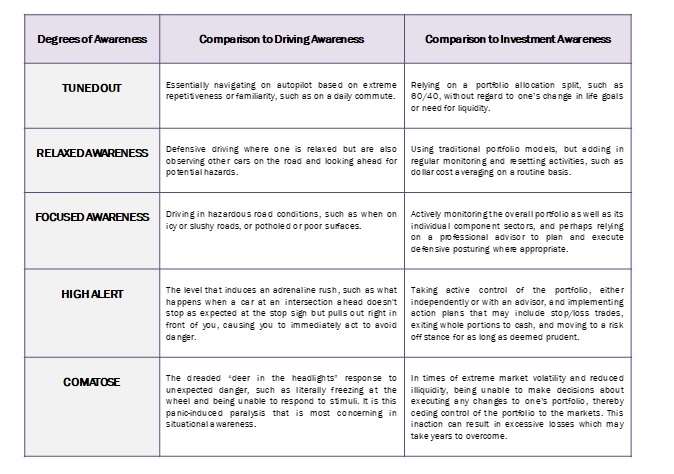By Diane Harrison Situational awareness means honing your ability to analyze the surrounding environment as an automatic practice while carrying on regular activities. The U.S. Coast Guard defines situational awareness as the ability to identify, process, and comprehend the critical elements of information about what is happening with regards to a mission. As their training manual states simply, it’s knowing what is going on around you. From an investment perspective, sharpening one’s overall desired investment goals and how best to achieve them is an ongoing and dynamic exercise in diligence and critical thinking. McKinsey & Company’s website published a book excerpt in 2015, Perspectives on the Long Term (Dominic Barton and Mark Wiseman), in which they referenced Nicholas G. Carr, author of The Glass Cage: Automation and Us, warning us not to secede from the power of active thinking: “…what decades of human-factors research tell us are that when computers and other machines take challenging tasks away from us, we turn into observers rather than actors. Distanced from our work, we lose our focus and become even more susceptible to distraction. And that ends up dulling our existing skills and hampering our ability to learn new ones. If you’ve ever gotten lost while following the step-by-step directions of a GPS device, you’ve had a small lesson in the way that computer automation erodes awareness of our surroundings and dulls our perceptions and talents.” IF IT CAN SAVE LIVES, IT CAN PROBABLY ASSIST INVESTMENT PORTFOLIOS Why is situational awareness important? The Coast Guard manual states that the consequence of not paying attention to it means that when we lose the bubble (i.e., Situational Awareness) we increase the potential for human error mishaps. Perhaps a more relevant question to ask in one’s investment planning is: “What might go wrong that will negatively impact me?” Investment planning requires research, surveillance, analysis, and reasoned decision-making…much like military planning. The achievement of a long-term successful investment plan shares more than a few traits with executing a successful military operation. As plans change, course correction occurs, and variables waylay the best-laid goals, this flux demands clear-headed redirection on a regular basis. Sounds an awful lot like the global markets on an average day, doesn’t it? When you compound that activity over decades—the lifecycle of most investment plans—things can get downright hairy to manage. OFFENSE REMAINS THE BEST DEFENSE So in reality, situational awareness is a heightened orientation towards your external surroundings. Scott Stewart provides an interesting comparison of awareness in his article, A Primer on Situational Awareness, stating that people typically operate on five distinct levels of awareness. He illustrates the differences between the levels by comparing them to the different degrees of attention we practice while driving. I thought it might be instructive to take this one step further and compare his driving levels of awareness to investment levels of awareness in varying degrees. Let these serve as a reminder of why knowing what’s going on around you is a meaningful state of awareness for investment perspectives.  DEVELOPING AN EAGLE EYE FOR YOUR OWN GOALS Maintaining perspective is a crucial element of any investment process. This is not to say there is any single master plan that achieves ultimate success; each approach must fit the needs of an investor and be tailored to achieve the three elements of risk/reward/timing in proper combination to suit this objective. To add complexity to this delicate balance, priorities and tolerances shift over time, as do the market environments and investment options available with which to construct these plans. The simple goal of achieving a successful investment program is anything but simple. Building a strong relationship with a professional advisor who can help map and manage your plan is priority number one for long-term success. No individual should cede the task of maintaining a close eye on their overall portfolio to an advisor and rely on someone else to ensure that all is well, all the time. Diane Harrison is principal and owner of Panegyric Marketing, a strategic marketing communications firm founded in 2002 specializing in alternative assets. She has over 25 years’ of expertise in hedge fund and private equity marketing, investor relations, articles, white papers, blog posts, and other thought leadership deliverables. In 2017, Panegyric Marketing has been awarded Global Fund Awards 2017 Financial Services Marketing Firm of the Year - NY, USA, Corporate Insider Business Excellence Awards 2017 Financial Marketing Firm of the Year – USA, and M&A Insider Awards 2017 Financial Services Marketing Firm of the Year – USA. A published author and speaker, Ms. Harrison’s work has appeared in many industry publications, both in print and on-line. To read more of her published work in alternatives, please visit www.scribd.com/dahhome. Contact: dharrison@panegyricmarketing.com or visit www.panegyricmarketing.com.
DEVELOPING AN EAGLE EYE FOR YOUR OWN GOALS Maintaining perspective is a crucial element of any investment process. This is not to say there is any single master plan that achieves ultimate success; each approach must fit the needs of an investor and be tailored to achieve the three elements of risk/reward/timing in proper combination to suit this objective. To add complexity to this delicate balance, priorities and tolerances shift over time, as do the market environments and investment options available with which to construct these plans. The simple goal of achieving a successful investment program is anything but simple. Building a strong relationship with a professional advisor who can help map and manage your plan is priority number one for long-term success. No individual should cede the task of maintaining a close eye on their overall portfolio to an advisor and rely on someone else to ensure that all is well, all the time. Diane Harrison is principal and owner of Panegyric Marketing, a strategic marketing communications firm founded in 2002 specializing in alternative assets. She has over 25 years’ of expertise in hedge fund and private equity marketing, investor relations, articles, white papers, blog posts, and other thought leadership deliverables. In 2017, Panegyric Marketing has been awarded Global Fund Awards 2017 Financial Services Marketing Firm of the Year - NY, USA, Corporate Insider Business Excellence Awards 2017 Financial Marketing Firm of the Year – USA, and M&A Insider Awards 2017 Financial Services Marketing Firm of the Year – USA. A published author and speaker, Ms. Harrison’s work has appeared in many industry publications, both in print and on-line. To read more of her published work in alternatives, please visit www.scribd.com/dahhome. Contact: dharrison@panegyricmarketing.com or visit www.panegyricmarketing.com.

←
Back to Portfolio for the Future™
SITUATIONAL AWARENESS: INVESTMENT PERSPECTIVE INTENSIFIED
August 23, 2017



